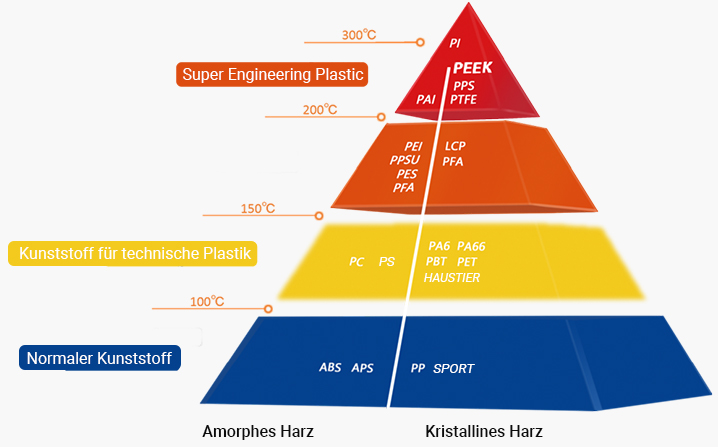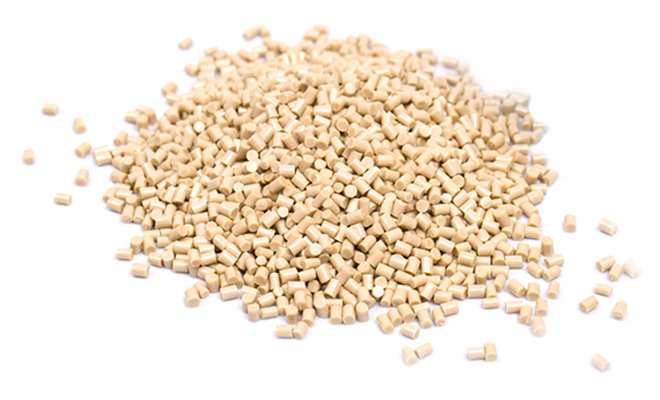Poly (ether ether ketone)(PEEK) is a linear polymer whose main chain is composed of Aryl, ketone and ether bonds. PEEK has a large number of benzene rings in its molecular chain, so its heat resistance can match that of polyimide, while two ether chains and a renegade group provide the material with flexibility and excellent workmanship.The structure is as follows:


 High Temperature Performance
High Temperature Performance High Wear Resistance
High Wear Resistance Mechanical Strength and Dimensional Stability
Mechanical Strength and Dimensional Stability Resistance to Harsh Chemicals
Resistance to Harsh Chemicals High Electrical Integrity
High Electrical Integrity High Purity & Bio Inert
High Purity & Bio Inert![]()
Aerospace
![]()
Food
![]()
Mechanics
![]()
Medicine
![]()
Oil and gas
![]()
Semiconductors
We started the PEEK polymerization project in 2014 and completed the pilot test in 2016. In 2018, Shandong Junhao HPP Co., Ltd. was officially established in Jining, Shandong Province, China, to carry out industrial production of PEEK polymerization, and finally in 2019, we complete the production of PEEK industrial chain.

UNFILLED PEEK has excellent physical and chemical properties in its own right. Its characteristics of high strength, high toughness, corrosion resistance, high temperature resistance, good insulation, high purity basically meet most of the industrial environment.
PEEK3600G is a high mobility pure PEEK particle, and PEEK7600G is a low mobility pure PEEK particle.
| Item | Test Standard or Instrument | Unit | (100%PEEK) PEEK3600G | (100%PEEK) PEEK5600G | (100%PEEK) PEEK7600G |
|---|---|---|---|---|---|
| Tensile strength (23 ℃) | ISO-527 | MPA | 97 | 95 | 94 |
| Tensile modulus (23 ℃) | ISO-527 | GPA | 4.1 | 4 | 4 |
| Tensile elongation (23 ℃) | ISO-527 | % | 15 | 25 | 40 |
| Bending strength (23 ℃) | ISO 178 | MPA | 175 | 169 | 163 |
| Bending modulus (23 ℃) | ISO 178 | GPA | 4.3 | 4.2 | 4.2 |
| Compressive strength (23 ℃) | ISO 604 | MPA | 125 | 125 | 125 |
| Charpy tched impact strength | ISO 179/u | KJ/M2 | 140 (No break) | 150 (No break) | 160 (No break) |
| LZOD notched impact strength | ISO 180/a | KJ/M2 | 5 | 6 | 7 |
Most standard reciprocating screw injection moulding machines are capable of moulding unfilled and filled PEEK grades. Complex and intricate high performance components can be mass-produced without annealing or conventional machining. technical experts can assist with design and process variables such as machine design, barrel capacity, screw and mold design and gating.
PEEK thermoplastics can be used in extrusion processes and equipment including wire coating, profile extrusion, film, pipe, sheet and monofilament production. Unfilled and filled grades are readily extruded using conventional melt processing technology. Our highly experienced technical team can help define the machine design and address any processing challenges.
Compression moulded parts are generally more crystalline, have a higher modulus and tensile strength and are harder with a lower ductility. Glass and carbon fibres may be combined with PEEK for compression moulding. Our technical team recommends that our customers anneal parts with very thick sections to relieve stresses.